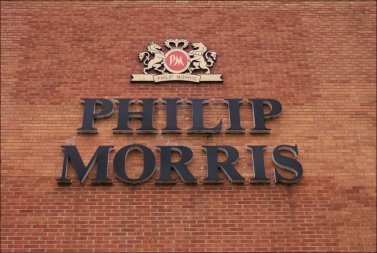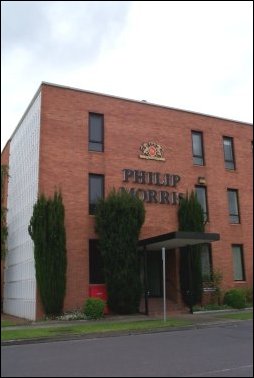Smoking in Moorabbin
When Moorabbin councillor Neil Hamilton proposed making all council-owned buildings smoke free, it wasn't even top of the agenda. The motion was put, debated and carried about 8.30pm on October 25, 1993.
Simple enough, it seemed. But that was only the start of it.
Before long, executives behind big desks in foreign countries were reading about the decision - and the counter-strategies were being put in place.
The executives were employed by Philip Morris Ltd. And some of the documents they read have now been posted on the Internet because of United States litigation.

The documents demonstrate the lengths the multinational tobacco giant was prepared to take to counter smoking bans by a council serving a population of 100,000 people in one far-flung corner of its empire.
One councillor of the day, Greg Alabaster, said he believed Philip Morris was most concerned about the impact the ban would have on sporting clubs. "They saw that as the thin edge of the wedge," he said.
Chief among those was St Kilda Football Club, based at Moorabbin Oval. If the ban came in, the AFL punters at the team's social club would not be able to have a smoke with their drinks.
Some of the details have faded, but former councillors remember a Philip Morris representative giving a presentation to the council.
A presentation planning document, dated February 21, 1994, outlined the Philip Morris position. Both smokers and non-smokers needed to be "accommodated", it said. It raised, as an example, St Kilda football club where, it claimed, "80 per cent of members smoke".
The presentation was also to cover the company's take on the legal position, the economic impact of smoking bans and the "science" of environmental tobacco smoke.
It also contained a "different perspective" on passive smoking, listing coffee, strawberries and outdoor air under the title "carcinogens" and "whole milk" under a category titled "increased lung cancer risk".
The conclusion? "Neither science nor the law requires or justifies governmentally imposed smoking restrictions or bans." Other points that could be "considered" included Philip Morris' role as a local employer. The Australian arm of Philip Morris is based at Moorabbin.

Administrative Building of Philip Morris at Moorabbin.
So it was that in a subsequent global company update on passive smoking the Australian section was able to report that "following a presentation to council, and subsequent submissions" the council voted to delay implementing the smoke bans for 12 months.
The motion ordering the delay, dated March 21, 1994, instructed council staff to investigate alternatives to the smoke ban, including "smoker accommodation", to investigate the economic impact of a ban and to consult with groups that leased council buildings.
These same groups were the ones being given information by Philip Morris and "encouraged" to lobby councillors about "smoker accommodation", according to the documents.
The council staff members Philip Morris judged responsible for preparing the report also came up in a company plan, which detailed the need to establish closer contact with them.
Four executive officers of the council had accepted invitations from the company to attend its corporate box at the MCG, with two more to be invited in June.
The then Moorabbin city manager, Doug Owens, now the chief executive of the City of Banyule, cannot remember if he was invited to a corporate box. But he is certain that he did not attend.
Did it concern him, in hindsight, that others had attended? "If you talk about being seen to do the right thing, clearly there's an issue there. If you talk about actual impact on decision ... I would say it would have no effect on the final outcome."
However, he does remember visiting the Philip Morris factory. According to the company's "Moorabbin Council smoker accommodation plan" documents, that visit, which included lunch, was on March 17 and Mr Owens was accompanied by five of the 12 councillors of Moorabbin. The way Mr Owens remembers it, the visit might have been part of an industry best practice group.
Some of the councillors, too, accepted invitations to the corporate box at the MCG. One document recorded five councillors had been entertained, two had declined and the remaining five would be invited to attend in June. The result of those invitations is not known.
Mr Hamilton, who raised the smoke-free push in the first place, largely out of concern the council might be sued in future passive smoking cases, said he did not attend - although he had previously been with the company to watch the Australian Open tennis in his role as chairman of a local employment training scheme.
But one of the former councillors who did go to the football, Bob Flavell, remembers being relieved to find there was "quite a party" of Moorabbin councillors and officers, with partners, in the corporate box. (He had been afraid he would not know anyone.)
Collingwood played Geelong, he said, which would put the date at May 8, 1994. "Nothing was said to us about anything relating to council matters," he said. "The thing we remember is that Gary Ablett took a spectacular mark."
Fellow councillor Barry Neve also went to the football with Philip Morris - which, he stressed, was the largest employer in the region or close to it - but cannot recall which game it was or when. Any suggestion that something like an invitation to the football could possibly influence 12 good councillors was "bulldust".
The way Philip Morris - which now turns over more than $60 billion a year between its tobacco, food and beer businesses - puts it, the efforts in Moorabbin represented business as usual.
The Australian arm was based in Moorabbin and "like any business we always take an active interest in our community", said the director of corporate affairs, Eric Windholz.
As it happens, council amalgamations meant the councillors of Moorabbin never got to vote on the deferred plan to go smoke free. It also seems the staff members never got to complete their report. The Philip Morris campaign was never really put to the test.
Years later, down at the Moorabbin Oval, St Kilda supporters can still have a smoke and a beer at the team's social club.
